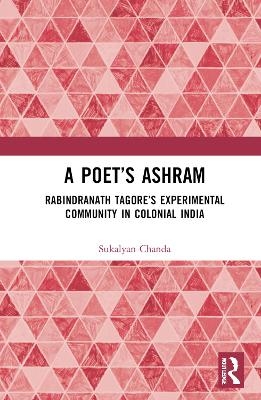
A Poet’s Ashram
Rabindranath Tagore’s Experimental Community in Colonial India
Seiten
2025
Routledge India (Verlag)
978-1-032-37153-5 (ISBN)
Routledge India (Verlag)
978-1-032-37153-5 (ISBN)
- Noch nicht erschienen (ca. Januar 2025)
- Versandkostenfrei innerhalb Deutschlands
- Auch auf Rechnung
- Verfügbarkeit in der Filiale vor Ort prüfen
- Artikel merken
The remarkably creative life of Rabindranath Tagore (1861-1941) has long been an area of scholarly enquiry. Yet, surprisingly, his role as the founder of an experimental ashram community remains unexplored. A Poet’s Ashram retrieves the idea of his ashram through an exploration of his writings on the institutions he built.
The ashram community Tagore endeavoured to create in Santiniketan during the period 1901-41 was an educational experiment, his response to the question of modernity and a way to reinvent the ancient Indian idea of the ashram. This book traces the history of how the ashram school evolved into a community that practiced egalitarianism, inclusiveness and creativity through its daily existence. It explores a range of nineteenth and twentieth century discourses and Tagore’s engagement with them to situate that idea within its historical context, a critical juncture in the history of modern India and the world. This book’s reading of his project unravels its anti-colonial underpinnings and the commonalities it shared with some of the other similar experimental communities that challenged illiberal ideologies and power relations during the early twentieth century.
Rich with archival material, this book will be of interest to students and researchers of history, political science, culture studies, English literature, Bengali literature, institution building, history of colonial modernity, and postcolonial studies. It will also be of interest to educationists, teachers, policymakers, and those interested in modern Indian history, the philosophy of education, peace, inclusivity and sustainability.
Chapters 1 and 4 of this book is freely available as a downloadable Open Access PDF at http://www.taylorfrancis.com under a Creative Commons [Attribution-Non Commercial-No Derivatives CC-BY-NC-ND 4.0 license.
The ashram community Tagore endeavoured to create in Santiniketan during the period 1901-41 was an educational experiment, his response to the question of modernity and a way to reinvent the ancient Indian idea of the ashram. This book traces the history of how the ashram school evolved into a community that practiced egalitarianism, inclusiveness and creativity through its daily existence. It explores a range of nineteenth and twentieth century discourses and Tagore’s engagement with them to situate that idea within its historical context, a critical juncture in the history of modern India and the world. This book’s reading of his project unravels its anti-colonial underpinnings and the commonalities it shared with some of the other similar experimental communities that challenged illiberal ideologies and power relations during the early twentieth century.
Rich with archival material, this book will be of interest to students and researchers of history, political science, culture studies, English literature, Bengali literature, institution building, history of colonial modernity, and postcolonial studies. It will also be of interest to educationists, teachers, policymakers, and those interested in modern Indian history, the philosophy of education, peace, inclusivity and sustainability.
Chapters 1 and 4 of this book is freely available as a downloadable Open Access PDF at http://www.taylorfrancis.com under a Creative Commons [Attribution-Non Commercial-No Derivatives CC-BY-NC-ND 4.0 license.
Sukalyan Chanda is Assistant Professor of English at Gushkara Mahavidyalaya, University of Burdwan, Gushkara, West Bengal, India.
1. Re-inventing the Idea of Ashram: Cultural Contexts 2. In Search of a ‘Spiritual Culture’: Rabindranath’s Ashram and the Politics of Self-respect 3. “The Message of the Forest”: Santiniketan and the Idea of Tapovana 4. Beyond National Boundaries: Visva-Bharati and the Question of Selfhood 5. Towards Swaraj: Ideals of Freedom at Rabindranath’s Ashram Epilogue
| Erscheint lt. Verlag | 24.1.2025 |
|---|---|
| Verlagsort | London |
| Sprache | englisch |
| Maße | 156 x 234 mm |
| Themenwelt | Geisteswissenschaften ► Sprach- / Literaturwissenschaft ► Literaturwissenschaft |
| Sozialwissenschaften ► Pädagogik ► Allgemeines / Lexika | |
| Sozialwissenschaften ► Pädagogik ► Bildungstheorie | |
| ISBN-10 | 1-032-37153-6 / 1032371536 |
| ISBN-13 | 978-1-032-37153-5 / 9781032371535 |
| Zustand | Neuware |
| Haben Sie eine Frage zum Produkt? |
Mehr entdecken
aus dem Bereich
aus dem Bereich
Buch | Softcover (2020)
Beuth (Verlag)
19,90 €


